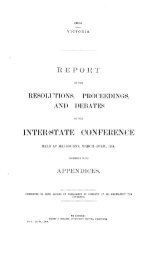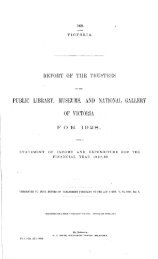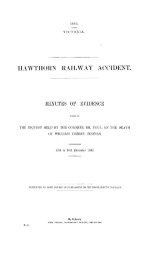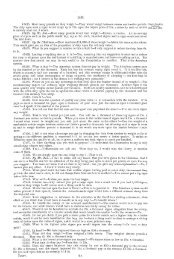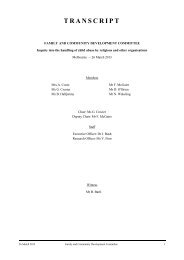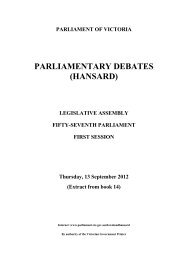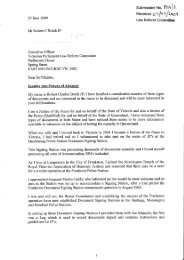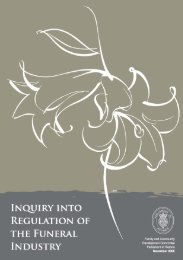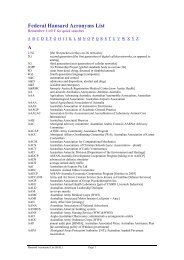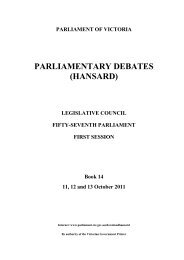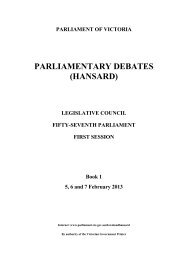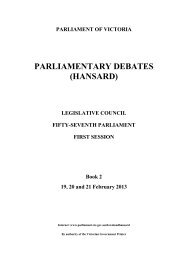Book 8 - Parliament of Victoria
Book 8 - Parliament of Victoria
Book 8 - Parliament of Victoria
You also want an ePaper? Increase the reach of your titles
YUMPU automatically turns print PDFs into web optimized ePapers that Google loves.
STATEMENTS ON REPORTS AND PAPERS<br />
Wednesday, 1 June 2011 COUNCIL 1661<br />
In the justice portfolio the Auditor-General’s <strong>of</strong>fice has<br />
flagged some work on court backlogs. With regard to<br />
the government’s tough-on-crime approach, I note that<br />
just yesterday we read in the papers and indeed talked<br />
about the on-the-spot fines for <strong>of</strong>fensive language. The<br />
government has also floated the idea <strong>of</strong> mandatory<br />
sentencing in some circumstances for minors. A great<br />
many changes are being undertaken in <strong>Victoria</strong> at the<br />
moment in the justice area. The way people have<br />
speedy access to justice and to remedies through the<br />
court system will be an area <strong>of</strong> focus for the<br />
Auditor-General’s <strong>of</strong>fice.<br />
Public transport performance is an important area, and<br />
that is also in the report. The report also talks about the<br />
Provincial <strong>Victoria</strong> Growth Fund. I imagine that work<br />
will involve an examination <strong>of</strong> the appropriateness <strong>of</strong><br />
spending and the identification <strong>of</strong> priorities for the<br />
Regional Growth Fund. That will certainly be <strong>of</strong> great<br />
interest to me. There is also the implementation <strong>of</strong> the<br />
climate change white paper and action on progress. The<br />
government seems to be going backwards at a great rate<br />
on this. Then there is the food bowl modernisation<br />
project, including the Sugarloaf interconnector.<br />
Government members have had a great deal to say<br />
today about our water security infrastructure, so we will<br />
have to wait and see.<br />
This is a good report. Unlike the Baillieu-Ryan<br />
government, the Auditor-General’s <strong>of</strong>fice has a work<br />
plan for four years that I urge members to look at. The<br />
Auditor-General is an independent <strong>of</strong>ficer <strong>of</strong> the<br />
<strong>Parliament</strong>, as is the Ombudsman, and is enshrined as<br />
an <strong>of</strong>ficer <strong>of</strong> the <strong>Parliament</strong> in the constitution. That is<br />
quite a contrast to the approach that Mr Baillieu’s<br />
mentor and friend Jeff Kennett and his government<br />
took, which was to nobble the <strong>of</strong>fice <strong>of</strong> the<br />
Auditor-General. This government does not talk the<br />
same language.<br />
The DEPUTY PRESIDENT — Order! The<br />
member’s time has expired.<br />
Drugs and Crime Prevention Committee:<br />
impact <strong>of</strong> drug-related <strong>of</strong>fending on female<br />
prisoner numbers<br />
Mrs COOTE (Southern Metropolitan) — It gives<br />
me great pleasure to speak on the government’s<br />
response to the Drugs and Crime Prevention<br />
Committee’s report entitled Impact <strong>of</strong> Drug-related<br />
Offending on Female Prisoner Numbers. This is a<br />
comprehensive response, as was the interim report. As I<br />
have said in this chamber before, this committee was<br />
chaired by the former member for Essendon, Judy<br />
Maddigan, and the committee did an excellent job. My<br />
colleague Mr Leane, who is in the chamber here today,<br />
was a part <strong>of</strong> that committee and also did an excellent<br />
job.<br />
It was an interesting inquiry, and although initially we<br />
were looking at the drug issues in the female prisons,<br />
we learnt a great deal about what is actually happening<br />
in those female prisons. When I was speaking on<br />
reports last week I spoke about the issue <strong>of</strong> appropriate<br />
housing for women after they leave prison. Today I<br />
would like to speak about the issue <strong>of</strong> women at<br />
Tarrengower, particularly in relation to them keeping in<br />
touch with their children.<br />
Many women who go to prison find it difficult to<br />
maintain their relationships with their children.<br />
Tarrengower is a farm just outside Maldon. It is a<br />
low-security prison for women who will eventually be<br />
reintegrated back into the community, and it is highly<br />
successful. Women can have their children to stay at<br />
Tarrengower, and I might add they can also do so at the<br />
Dame Phyllis Frost centre in Deer Park. Children up to<br />
school age can live with their mothers in prison, should<br />
the mothers feel they want that, and there are very good<br />
programs run out <strong>of</strong> Dame Phyllis Frost for children in<br />
the prison system. I remember it was a huge step when<br />
it was first instigated many decades ago.<br />
However, the problem we discovered when we went to<br />
Tarrengower was that every telephone call the women<br />
make to their children is in fact an STD call. The<br />
women only get paid a small daily wage, and they are<br />
faced with the dilemma <strong>of</strong> whether to ring their children<br />
or to use the limited funds they earn for toiletries —<br />
shampoo, health products et cetera. The<br />
recommendation in the report is to subsidise either the<br />
telephone calls or the toiletries.<br />
The difficulty with this, which was something our<br />
committee did not look at in great detail, or in fact even<br />
recognise as an issue, was that there are inmates in<br />
prisons right across our state who face a similar<br />
dilemma. There are many men in country prisons who<br />
want to maintain relationships with their children. To<br />
have a blanket approach to contacting children from<br />
prison is going to be quite an expensive exercise, so it is<br />
important that it is done correctly. On the one hand we<br />
want to support women so they have continuous<br />
contact with their children. On the other hand we have<br />
to be realistic with taxpayers money and make quite<br />
certain that telephone calls are made responsibly. In its<br />
reply to the interim report the government supported<br />
this recommendation in part. Basically its reasons were<br />
that it would be prohibitive to include all telephone<br />
calls that prisoners — male and female — in country<br />
areas make to their children.



